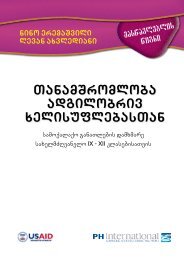The Geneva Protocol, by David Hunter Miller
The Geneva Protocol, by David Hunter Miller
The Geneva Protocol, by David Hunter Miller
You also want an ePaper? Increase the reach of your titles
YUMPU automatically turns print PDFs into web optimized ePapers that Google loves.
CHAPTER XX. 142<br />
"<strong>The</strong> Members of the League agree that they will comply with the {237} recommendations contained in any<br />
award of the Arbitration Tribunal set up <strong>by</strong> the Council as above.<br />
"In the event of any failure to comply with the recommendations of a report concurred in <strong>by</strong> all the Members<br />
of the Council other than the parties to the dispute or in any award of an arbitration tribunal set up <strong>by</strong> the<br />
Council as above, the Council shall exert all its influence to secure compliance therewith. If such failure to<br />
carry out the recommendations is accompanied <strong>by</strong> any resort to war, the sanctions provided for in article 16,<br />
interpreted as provided in this <strong>Protocol</strong>, shall be applied."<br />
44. <strong>The</strong> British Delegate explained that the willingness of Governments to amend the Covenant must be<br />
clearly expressed in the <strong>Protocol</strong>. In no other way could the danger of creating within the League an inner ring<br />
of Powers, bound towards each other <strong>by</strong> ties and obligations more close than those binding the ordinary<br />
members of the League, be avoided. <strong>The</strong> drafting of amendments to the Covenant was, however, a technical<br />
matter, and time was short. He therefore suggested that the Council should be asked to set up a committee of<br />
experts to draft the amendments to the Covenant contemplated <strong>by</strong> the <strong>Protocol</strong>.<br />
45. <strong>The</strong>se proposals provided the bases of articles 1, 3 and 4 of the <strong>Protocol</strong> and of paragraph 3 of the<br />
Assembly Resolution of the 2nd October. <strong>The</strong> bases of articles 2 and 5 had already been established. Article<br />
10 was beginning to take shape in new drafts in substitution for Dr. Benes's definition of an aggressor. On the<br />
21st September these articles were provisionally adopted <strong>by</strong> the joint drafting committee of the First and<br />
Third Committees. At this stage, therefore, for the first time, the substance of a workable text on the subjects<br />
referred to the First Committee began to emerge from the shadow of discussion.<br />
46. Throughout this period, however, the negotiations had been carried on entirely in the sub-committee in<br />
secret sessions. Although the closest possible touch had been kept <strong>by</strong> the British Delegation with the<br />
Dominion and Indian Delegations, the British representative felt himself to be in a position {238} of great<br />
responsibility in carrying on the work in the sub-committee. He felt that a stage had been reached where a<br />
wider consultation was necessary, as, with the exception of the Attorney-General of the Irish Free State, who<br />
was unfortunately obliged to return to Ireland about this date, he was the only British member. He proposed,<br />
therefore, that the work of the sub-committee should be reported to the full Committee on which all the<br />
Dominion and Indian Delegations were represented. <strong>The</strong> full Committee thereupon met on the 24th<br />
September, and then and at further meetings held on the 25th, 26th, 27th and 28th September, the articles of<br />
the <strong>Protocol</strong> were fully discussed in public sessions. <strong>The</strong> articles of the <strong>Protocol</strong> under consideration thus took<br />
their shape in the sub-committee, they were then submitted to the Joint Drafting Committee representing the<br />
First and Third Committees, and were then finally approved after public discussions in Committee No. 1.<br />
Here, then, it will be convenient to deal with the purpose and evolution of each article separately.<br />
<strong>The</strong> Preamble.<br />
47. <strong>The</strong> draft of the Preamble, as revised <strong>by</strong> the Joint Drafting Committee of the First and Third Committees,<br />
was adopted at a plenary session of the First Committee on the 27th September. <strong>The</strong> Lithuanian Delegate<br />
made a reservation that the reference to territorial security in no way prejudiced existing disputes between<br />
States signing the <strong>Protocol</strong>. <strong>The</strong> Portuguese Delegate proposed an amendment to substitute for the word<br />
"territories" in the first sentence, the phrase "territories under the sovereignty of States." <strong>The</strong> object was to<br />
make it clear that oversea territories under the sovereignty of a State were not excluded, but the British<br />
representative reminded the committee of the nature of the varied character of the territories of the British<br />
Empire, and said that if one class of oversea territories were mentioned, all must be mentioned. <strong>The</strong><br />
amendment was rejected.<br />
{239}<br />
Article 1.
















